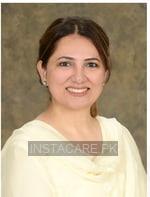Vitamin D Deficiency - Symptoms, Risk factors and Treatment
Last Updated On Wednesday, July 2, 2025
Vitamin D Deficiency in Urdu
وٹامن ڈی کی کمی کا مطلب ہے کہ آپ کے جسم میں وٹامن ڈی کی سطح اس مناسب سطح کے مقابلے میں کم ہے جو اچھی طرح سے کام کرنے کے لیے ضروری ہے۔ یہ دوسرے وٹامنز سے مختلف ہے کیونکہ آپ کا جسم اسے سورج کی روشنی میں کولیسٹرول سے پیدا کرتا ہے۔ گوری رنگت والے اور نوجوان لوگ کولیسٹرول کو وٹامن ڈی میں تبدیل کرتے ہیں ان لوگوں کے مقابلے میں جو سیاہ فام اور 50 سال سے زیادہ عمر کے ہیں۔ اگر آپ میں وٹامن ڈی کی کمی ہے تو آپ اس کی کمی کو دور کرنے کے لیے ایک سپلیمنٹ شامل کر سکتے ہیں۔
Vitamin D Deficiency in English
Vitamin D deficiency means you have a lower vitamin D level in your body as compared to an adequate level that is needed to function well. It is different from other vitamins because your body produces it from cholesterol, upon exposure to sunlight. Fair-skinned and young people convert cholesterol into vitamin D far better than those who are dark-skinned and above 50 years of age. If you are vitamin D deficient, you can incorporate a supplement to overcome its deficiency.
How is Vitamin D Beneficial For You?
Vitamin D has many beneficial effects on your body. It plays a role in treating and preventing diseases like;
- Multiple sclerosis Heart disease
- Hypertension or high blood pressure
- Diabetes
- Infections and immune system disorders
- Fractures
- Osteoporosis
- Depression
- Asthma
- Falls in older people
- Colon cancer
- Prostate cancer
- Breast cancers.
Signs and Symptoms of Vitamin D deficiency
The signs and symptoms of vitamin D deficiency are;
Compromised immunity
When you have low vitamin D levels in your body, you become prone to infections as your immunity is compromised. Maintaining adequate levels of vitamin D helps to build your immunity, hence preventing and fighting off infections. According to a study, a low level of vitamin D puts you at risk of catching respiratory tract infections like cold and flu.
Fatigue and Tiredness
People having low vitamin D levels often complain about excessive fatigue and tiredness. You may even feel tired and lethargic in the daytime. Vitamin D helps in keeping you active and healthy.
Bone and Back Pain
Vitamin D is essential for your bone health, not just because of its effects on your bones. But also because it helps in calcium absorption in your bones. Low levels of vitamin D can cause back pain. It can also be accompanied by rib pain, pain in the legs, and joint pain.
Depression
Vitamin D deficiency can cause depression, especially the season-associated depression that mostly happens in winter.
Impaired Wound Healing
According to a study, vitamin D increases compounds that are essential in the formation of the skin. Therefore its deficiency can lead to impaired wound healing. Also, it can compromise your immunity, so wound healing is affected. Its deficiency can also increase the inflammatory mediators that hinder wound healing.
Bone Loss
Vitamin D plays a role in getting calcium absorbed in your bones. Even if you keep taking calcium and your diet is deficient in vitamin D, your bones would not get enough calcium. Therefore to keep your bones healthy, strong, and protected from fractures, you need to consume an adequate amount of vitamin D.
Hair Loss
Nutritional deficiency of vitamin D deficiency can cause hair loss. Therefore to protect yourself from alopecia, you should consume an optimal amount of vitamin D.
Muscle Pain
Vitamin D deficiency can also cause muscle pain.
How Can You Get Vitamin D?
To get vitamin D, the following things can work;
Get yourself exposed to sunlight early in the morning for at least 20 minutes, three days a week.
Take nutritional supplements containing vitamin D.
Incorporate foods in your diet that contain vitamin D. Foods that can give you vitamin D are;
- Cod liver oil
- Swordfish
- Salmon
- Tuna
- Orange juice fortified with vitamin D
- Vitamin-fortified milk
- Vitamin-fortified yogurt
- Liver
- Beef
- Egg yolk
- Cheese
Recommended dietary allowance (IU/day) of vitamin D a Person Needs According to Age;
- Infants 0-6 months*- 400
- Infants 6-12 months*- 400
- Children 1-3 years old- 600
- Children 4-8 years old- 600
- People 9-70 years old - 600
- People over 70 years old- 800
- Females 14-50 years old Pregnant/lactating- 600
Conclusion
Vitamin D deficiency is a condition when your body has a low level of vitamin D as per your body's requirement. It can make you feel fatigued along with bone and muscle pain. However, overcoming vitamin D deficiency is not a difficult task. You can replenish its stores by getting yourself exposed to sunlight and taking a nutritional supplement.









